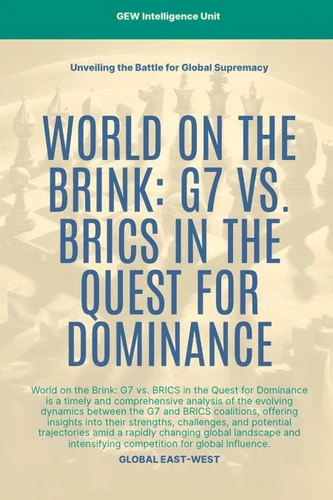World On The Brink: G7 Vs. BRICS In The Quest For Dominance. Geopolitics
Par :Formats :
Disponible dans votre compte client Decitre ou Furet du Nord dès validation de votre commande. Le format ePub protégé est :
- Compatible avec une lecture sur My Vivlio (smartphone, tablette, ordinateur)
- Compatible avec une lecture sur liseuses Vivlio
- Pour les liseuses autres que Vivlio, vous devez utiliser le logiciel Adobe Digital Edition. Non compatible avec la lecture sur les liseuses Kindle, Remarkable et Sony
- Non compatible avec un achat hors France métropolitaine
 , qui est-ce ?
, qui est-ce ?Notre partenaire de plateforme de lecture numérique où vous retrouverez l'ensemble de vos ebooks gratuitement
Pour en savoir plus sur nos ebooks, consultez notre aide en ligne ici
- FormatePub
- ISBN8227742896
- EAN9798227742896
- Date de parution15/07/2024
- Protection num.Adobe DRM
- Infos supplémentairesepub
- ÉditeurBig Dog Books, LLC
Résumé
The driving idea behind this study is to explore the shifting power dynamics in the contemporary world and the significant role of coalition-based strategies in shaping global politics. The book delves into the concept of the 'New World Order, ' which signifies a transformative period characterized by changing alliances and emerging geopolitical influences. It aims to analyze how major global players like the G7 and BRICS navigate this new landscape by forming strategic coalitions to enhance their political, economic, and security objectives.
The study emphasizes that coalition formations are essential in addressing shared challenges, enhancing collective capabilities, and managing power shifts effectively. It highlights how technological advancements, economic competition, and cultural diplomacy are critical factors influencing global dominance and leadership. The comparison between G7 and BRICS provides insights into their distinct approaches to energy resources, environmental policies, military alliances, and soft power tactics.
Additionally, the book examines the broader implications of these coalitions on public opinion, media influence, cybersecurity, migration, healthcare, and international cooperation. By understanding these dynamics, the study underscores the importance of adapting to the complexities of international relations and fostering a more cooperative and peaceful global environment. In essence, the study serves as a comprehensive guide to understanding the evolving global order, the strategic imperatives driving coalition formations, and the future prospects of global leadership.
It calls for stakeholders to engage in informed and collaborative efforts to navigate the multifaceted challenges of the modern world.
The study emphasizes that coalition formations are essential in addressing shared challenges, enhancing collective capabilities, and managing power shifts effectively. It highlights how technological advancements, economic competition, and cultural diplomacy are critical factors influencing global dominance and leadership. The comparison between G7 and BRICS provides insights into their distinct approaches to energy resources, environmental policies, military alliances, and soft power tactics.
Additionally, the book examines the broader implications of these coalitions on public opinion, media influence, cybersecurity, migration, healthcare, and international cooperation. By understanding these dynamics, the study underscores the importance of adapting to the complexities of international relations and fostering a more cooperative and peaceful global environment. In essence, the study serves as a comprehensive guide to understanding the evolving global order, the strategic imperatives driving coalition formations, and the future prospects of global leadership.
It calls for stakeholders to engage in informed and collaborative efforts to navigate the multifaceted challenges of the modern world.
The driving idea behind this study is to explore the shifting power dynamics in the contemporary world and the significant role of coalition-based strategies in shaping global politics. The book delves into the concept of the 'New World Order, ' which signifies a transformative period characterized by changing alliances and emerging geopolitical influences. It aims to analyze how major global players like the G7 and BRICS navigate this new landscape by forming strategic coalitions to enhance their political, economic, and security objectives.
The study emphasizes that coalition formations are essential in addressing shared challenges, enhancing collective capabilities, and managing power shifts effectively. It highlights how technological advancements, economic competition, and cultural diplomacy are critical factors influencing global dominance and leadership. The comparison between G7 and BRICS provides insights into their distinct approaches to energy resources, environmental policies, military alliances, and soft power tactics.
Additionally, the book examines the broader implications of these coalitions on public opinion, media influence, cybersecurity, migration, healthcare, and international cooperation. By understanding these dynamics, the study underscores the importance of adapting to the complexities of international relations and fostering a more cooperative and peaceful global environment. In essence, the study serves as a comprehensive guide to understanding the evolving global order, the strategic imperatives driving coalition formations, and the future prospects of global leadership.
It calls for stakeholders to engage in informed and collaborative efforts to navigate the multifaceted challenges of the modern world.
The study emphasizes that coalition formations are essential in addressing shared challenges, enhancing collective capabilities, and managing power shifts effectively. It highlights how technological advancements, economic competition, and cultural diplomacy are critical factors influencing global dominance and leadership. The comparison between G7 and BRICS provides insights into their distinct approaches to energy resources, environmental policies, military alliances, and soft power tactics.
Additionally, the book examines the broader implications of these coalitions on public opinion, media influence, cybersecurity, migration, healthcare, and international cooperation. By understanding these dynamics, the study underscores the importance of adapting to the complexities of international relations and fostering a more cooperative and peaceful global environment. In essence, the study serves as a comprehensive guide to understanding the evolving global order, the strategic imperatives driving coalition formations, and the future prospects of global leadership.
It calls for stakeholders to engage in informed and collaborative efforts to navigate the multifaceted challenges of the modern world.




















